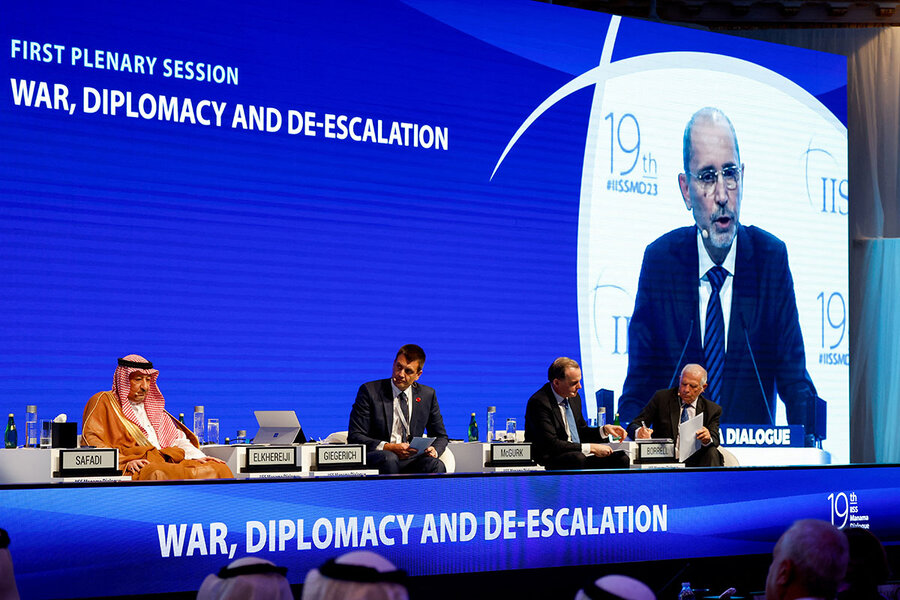Letter from Manama: Israel-Hamas war stumps the experts
| Manama, Bahrain
Exasperated sighs and skeptical “hmm”s – these were the sounds of a conference on Middle East cooperation dominated by a war that few foresaw and even fewer know how to stop.
The scene was the annual Manama Dialogue hosted by the International Institute for Strategic Studies, an august British think tank. It was held last weekend in the capital of Bahrain, a sleepy but strategic Persian Gulf kingdom, welcoming senior diplomats, robed Gulf princes, decorated military officers, and analysts from around the world to the marble-floored Ritz Carlton.
The plan had been to discuss ways of working together to confront common challenges. Instead, participants – like the rest of the world – were stumped by the Israel-Hamas war in Gaza.
Predictably, speakers condemned Hamas’ brutal Oct. 7 attack on Israel, called for the release of hostages, and urged Israel to halt its punishing military campaign in Gaza.
But it took only minutes for deep differences to boil to the surface.
It began when Brett McGurk, the Biden administration’s National Security Council coordinator for the Middle East, ruled out calls for a cessation of Israel’s military offensive and to end the war, saying that “calling for a cease-fire is not a path to peace.”
He was rebuked onstage and panned by eye-rolling conferencegoers during the coffee break. “Very unimpressive,” lamented one European diplomat.
“It is as if the Biden administration sees a different conflict and lives in a different world,” a Arab Gulf official told me.
Disillusioned Arab Gulf officials said the war had punctured their belief that they could make peace with Israel and normalize relations while leaving the Israeli-Palestinian conflict unresolved.
With palpable frustration in the air, Anwar Gargash, political adviser to Mohamed bin Zayed, president of the United Arab Emirates, openly wondered whether the world had reached “an Iraq moment,” referring to the 2003 war that reshaped the Middle East, deepened distrust of the West, and bolstered extremists.
For hours, old peace process hands, highly skilled diplomats, and keen military strategists struggled with unanswered questions.
Israel’s military objective, to eradicate Hamas, was unachievable, they agreed. But what then?
All rejected the displacement of Palestinian residents of Gaza outside the strip and an Israeli reoccupation, but who, exactly, would take political and economic responsibility for a flattened Gaza Strip?
How would yet another attempt to revive a two-state solution be different from the dozens that have failed?
As aproned staff carefully arranged porcelain cups and saucers ahead of the next coffee break, Jordanian Foreign Minister Ayman Safadi worried that debating postwar Gaza options in a glitzy hotel, even as war raged, was akin to watching “someone torching the whole place” but waiting for them to finish to say, “‘Now let’s put the fire out.’”
“We have to stop the killing.”






